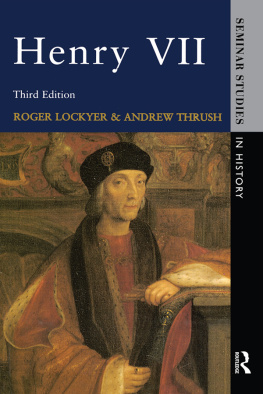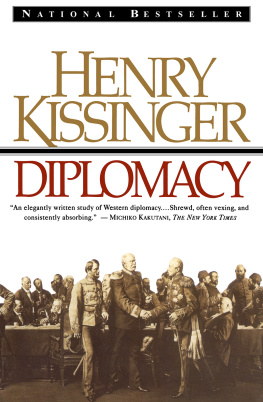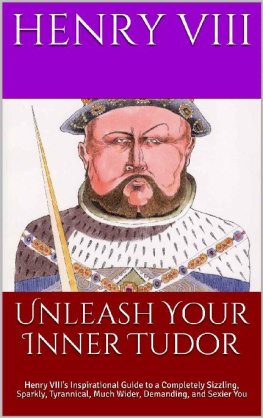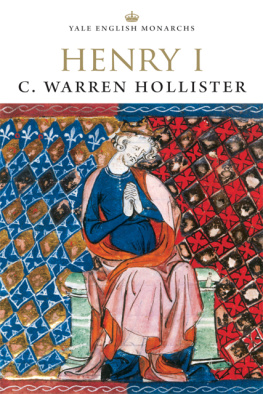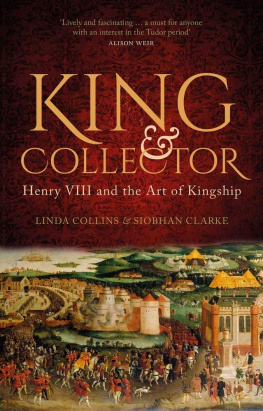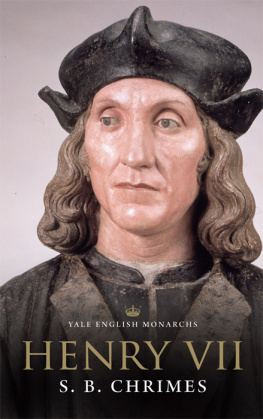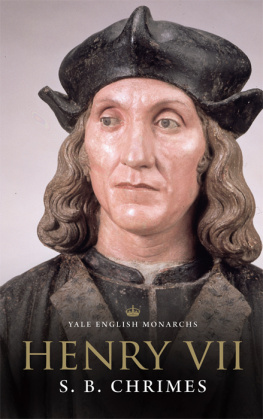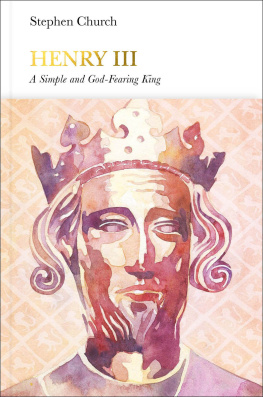HENRY VII
Henry VII
THIRD EDITION
ROGER LOCKYER
and
ANDREW THRUSH
First published 1968 by Pearson Education Limited
Second edition 1983
Third edition 1997
Published 2014 by Routledge
2 Park Square, Milton Park, Abingdon, Oxon OX14 4RN
711 Third Avenue, New York, NY 10017, USA
Routledge is an imprint of the Taylor & Francis Group, an informa business
Copyright 1968, 1997, Taylor & Francis.
The rights of Roger Lockyer and Andrew Thrush to be identified as the authors of this Work have been asserted by them in accordance with the Copyright, Designs and Patents Act 1988.
All rights reserved. No part of this book may be reprinted or reproduced or utilised in any form or by any electronic, mechanical, or other means, now known or hereafter invented, including photocopying and recording, or in any information storage or retrieval system, without permission in writing from the publishers.
Notices
Knowledge and best practice in this field are constantly changing. As new research and experience broaden our understanding, changes in research methods, professional practices, or medical treatment may become necessary.
Practitioners and researchers must always rely on their own experience and knowledge in evaluating and using any information, methods, compounds, or experiments described herein. In using such information or methods they should be mindful of their own safety and the safety of others, including parties for whom they have a professional responsibility.
To the fullest extent of the law, neither the Publisher nor the authors, contributors, or editors, assume any liability for any injury and/or damage to persons or property as a matter of products liability, negligence or otherwise, or from any use or operation of any methods, products, instructions, or ideas contained in the material herein.
ISBN-13: 978-0-582-20912-1 (pbk)
British Library Cataloguing in Publication Data
A catalogue record for this book is
available from the British Library
Library of Congress Cataloging-in-Publication Data
Lockyer, Roger.
Henry VII / Roger Lockyer and Andrew Thrush. -- 3rd ed.
p. cm. -- (Seminar studies in history)
Includes bibliographical references and index.
ISBN 0-582-20912-9 (alk. paper)
1. Great Britain--Politics and government--14851509.
2. Finance, Public--Great Britain--To 1688.
3. Great Britain--History--Henry VII, 14851509.
I. Thrush, Andrew. II. Title. III. Series.
JN181.L63 1997
Set by 7 in 10/12 Sabon
Such is the pace of historical enquiry in the modern world that there is an ever-widening gap between the specialist article or monograph, incorporating the results of current research, and general surveys, which inevitably become out of date. Seminar Studies in History are designed to bridge this gap. The books are written by experts in their field who are not only familiar with the latest research but have often contributed to it. They are frequently revised, in order to take account of new information and interpretations. They provide a selection of documents to illustrate major themes and provoke discussion, and also a guide to further reading. Their aim is to clarify complex issues without over-simplifying them, and to stimulate readers into deepening their knowledge and understanding of major themes and topics.
Readers should note that numbers in square brackets [5] refer them to the corresponding entry in the Bibliography at the end of the book (specific page numbers are given in italics). A number in square brackets preceded by Doc. [Doc. 5] refers readers to the corresponding item in the Documents section which follows the main text.
The first edition of this Seminar Study was published in 1968, but since that time a great deal of work has been done on the Yorkist and early Tudor period, and many of the interpretations put forward in the first edition are no longer tenable. This second edition, therefore, is not so much a revision of the earlier text as a complete rewriting. It contains a number of new sections, such as those on The Common Law and Chancery and The Church. It also omits the sections on The machinery of government and The weakness of the Crown which appeared in the earlier version. The main reason for this is the addition to the Seminar Studies Series of David Cooks study of Lancastrians and Yorkists: The Wars of the Roses, which deals with the half-century preceding Henry VIIs accession.
ROGER LOCKYER, 1982
Since the publication of the second edition of this Seminar Study the pace of research into the early Tudor period has not slackened, and many interpretations formerly taken for granted have now had to be revised. There is not always agreement on what to put in their place, and this third edition of Henry VII should therefore be regarded as, in certain respects, an interim report on a continuing debate. We decided to drop the brief section on Rural and Urban Society which opened the Background section of previous editions in order to devote more space to the crucial chapters on Henrician finance and government, which have been completely rewritten, as has the chapter on Henrys foreign policy. The Documents section has also been expanded. This third edition is the joint work of Roger Lockyer and his former student and colleague, Dr Andrew, Thrush, who has made it his objective to keep abreast of the latest work on the first Tudor.
ROGER LOCKYER & ANDREW THRUSH, 1996
The publishers would like to thank the following for permission to reproduce copyright material: The Royal Historical Society for extracts from Camden Third Series, Vol. LXXIV, The Anglica Historia 14851537 by Polydore Vergil, edited and translated by Denys Hay; The Seiden Society for extracts from Select Cases in the Council of Henry VII, by C.G. Baynes; Extracts from the Calendar of the Close Rolls Henry VII, Vol. II 15001509 and Statutes of the Realm. Crown copyright is reproduced with the permission of the Controller of Her Majestys Stationery Office.
In 1399 Henry Bolingbroke, Duke of Lancaster, deposed Richard II and seized the throne for himself. Although he thereby established the House of Lancaster as the ruling dynasty he had set an example that other ambitious magnates would one day follow, with fateful consequences for his descendants. The second Lancastrian monarch, Henry V, who succeeded his father in 1413, won prestige for himself and his dynasty by reasserting the old claim to France, taking an army across the Channel, and winning a resounding victory at Agincourt in 1415. But Henry V died in 1422, leaving as heir a baby son. A minority was always a dangerous time for a dynasty, particularly one so recently established, but the magnates who surrounded the infant Henry VI behaved with remarkable restraint and protected his inheritance.
It was only when Henry came of age that things started to go badly wrong. One reason for this was that the early triumphs in France had given way to defeats, and the financial strain of maintaining the English armies there was causing unrest at home. Another, and more important, reason was Henrys singular lack of the qualities needed to make a successful ruler. He was too easily swayed by those around him, and open-handed to the point of irresponsibility. By giving away royal lands and patronage to those he favoured, he blew into flames the smouldering jealousies among the magnates and thereby precipitated violent quarrels between them that he proved unable to resolve [31; 33]. Henrys incapacity and occasional relapses into insanity intensified rivalry among the leading nobles and led directly to the conflicts between them that became known as the Wars of the Roses. The only possible outcome to these, other than stalemate, was the triumph of one of the magnate factions, and this came about in March 1461 when Edward, Duke of York, destroyed the Lancastrian army at Towton in Yorkshire. Just over a year later he was crowned king as Edward IV.


